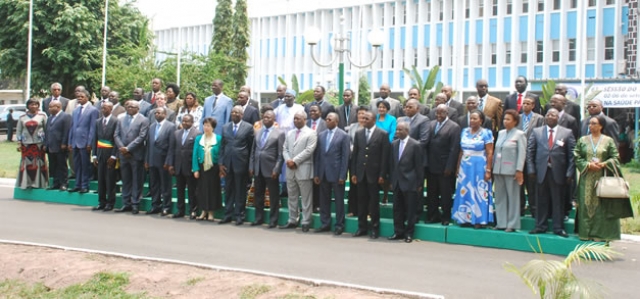WHO Regional Committee Meeting Opens in Brazzaville, Congo
 Brazzaville, 2 September 2013 -- President Denis Sassou Nguesso of Congo has pledged that his country would continue to meet its financial commitments to the World Health Organization (WHO), and called on the international community to ensure sustained financial support to the UN health agency so that it can effectively carry out its mandate of improving the health of the people.
Brazzaville, 2 September 2013 -- President Denis Sassou Nguesso of Congo has pledged that his country would continue to meet its financial commitments to the World Health Organization (WHO), and called on the international community to ensure sustained financial support to the UN health agency so that it can effectively carry out its mandate of improving the health of the people.
“Congo affirms its willingness to honour all commitments including its contribution to the African Public Health Emergency Fund (APHEF) as well as its regular statutory contributions to WHO”, the Congolese leader said, in remarks at the start of the 63rd session of the Ministers of Health of the WHO African Region in Brazzaville.
President Denis Sassou Nguesso was represented at the occasion by the Minister of State and Minister of Works and Social Security, Mr Florent Ntsiba. He pointed out that the difficulties facing the economies of donor countries was adversely affecting WHO operations, and that greater international solidarity was needed to ensure that WHO continued to deliver on its mandate
The trend towards globalization means that health is a cross-border issue which requires that all countries must be willing to work together for global health, he added.
In her address, WHO Director-General, Dr Margaret Chan, observed that the Region is experiencing “huge leaps ahead in human development, including steep declines in HIV infections, malaria, child mortality and fast growing rates of primary school completion.”
“Africa is changing. Africa is rising. Africa is at a unique juncture in its history “, she said, advising the Region’s leaders to ensure equitable access to health care which she described as “one of the best ways to ensure that the benefits of economic growth are evenly distributed.”
She cautioned that critical political choices need to be made as African countries change for the better. “Rapid economic growth carried a classic risk” she said, adding that “unless the right policies are in place, the rich get richer while the misery and sickness of the poor endure”.
Dr Chan underscored the importance of home –grown solutions to health problems, alignment of aid and universal coverage focusing on quality care and social.
In his speech, WHO Regional Director for Africa, Dr Luis Sambo, stated that since independence, countries had registered notable successes in the fight against diseases such as small pox (which has been eliminated); sleeping sickness (now only found in certain isolated pockets); river blindness (which is under control); polio (which has been considerably reduced), and Guinea worm disease, which is on the verge of being eradicated.
“This progress has been possible due to the re-orientation of health services in Africa which prioritizes primary health care,” Dr Sambo said.
Referring to communicable diseases, Dr Sambo stated that countries were making efforts to reduce the burden and deaths attributable to diseases such as HIV/AIDS, malaria and tuberculosis, pointing out that the release of WHO’s new guidelines on the use of antiretroviral therapy for HIV prevention and treatment was worthy of note in this regard. Just as important is the publication of a roadmap for reducing the impact of neglected tropical diseases (NTDs) and the adoption by the World Health Assembly of the Global Vaccine Action Plan.
He reminded delegates that in 2012, the Regional Committee endorsed the Brazzaville Declaration on noncommunicable diseases (NCDs) with recommendations for countries to organize a multisectoral dialogue to develop a framework for addressing NCDs.
Regarding epidemic preparedness and response, the Regional Director stated that the African Public Health Emergency Fund is now operational with contributions from five countries totaling US$1.7 million.
Dr Sambo pointed out that recommendations to address the issue of mother, newborn and reproductive health are highlighted in a report of the Commission on Women's Health in the African Region chaired by H.E. Ellen Johnson Sirleaf, President of the Republic of Liberia.
He recommended six actions countries should take in light of prevailing challenges and some opportunities to improve health. These include: stepping up of efforts to achieve the health-related Millennium Development Goals (MDGs) and to reduce the burden of NCDs and NTDs; active participation by countries in discussions to define the post-2015 health agenda priorities as well as the implementation of the International Health Regulations were suggested. Other actions include putting mechanisms in place to achieve universal health coverage along with carrying out WHO and Member State’s joint vision to improve the health of people.
This year’s session under the theme ‘Investing in health for sustainable development’ will discuss the health of the elderly; the use of eHealth solutions to improve national health systems; strengthening the capacity of national medicines regulatory authorities, and the implementation of WHO’s new guidelines on the use of antiretroviral therapy for HIV prevention and treatment.
________________________________________________
For more information, please contact:
Collins Boakye-Agyemang tel +47-241-39420; e-mail: Boakyeagyemangc [at] who.int (Boakyeagyemangc[at]who[dot]int)
Samuel T. Ajibola, tel +47-241-39378; e-mail: ajibolas [at] who.int (ajibolas[at]who[dot]int)


